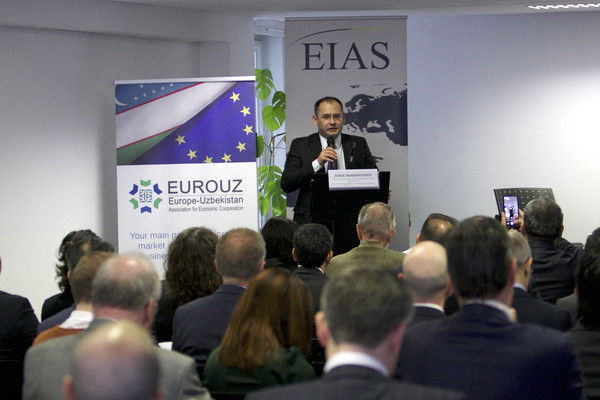The annual Europe-Uzbekistan business meeting was held in Brussels. It brought together business and political leaders just days after the signing of the roadmap in Luxembourg – Eureporter.
This is an exciting time for relations between the EU and Central Asia’s most populous country, according to Nick Powell.
Why is it such a fruitful time for the two sides? Firstly, Central Asia is now a much bigger focus for Europe, as people are looking for a region of peace, growth and stability, a market of 80 million people. Secondly, German exports to Uzbekistan have doubled in the last two years alone, especially machinery for industrial use, says Klaus Mangold, the chair of EUROUZ, the Europe-Uzbekistan Association for Economic Cooperation.
“Raw materials and an educated people equals industrialisation.”
Uzbekistan has an advantage in manufacturing, thanks to its long tradition in the textile industry, he urged Germany and Europe as a whole to realise that the country has an employment bottleneck due to an ageing workforce. He also argued that young people from Central Asia should be allowed to enter the EU to study for four to five years and then return home with the skills they have learnt.
The relationship between the EU and Uzbekistan is important not only from an economic point of view. It is an important partner for stability and security, and the partnership is open. The EU does not expect exclusivity and understands Uzbekistan’s historical relations, including with Russia and China, said Dietmar Krissler of the European External Action Service.
In a video message, European Commissioner for International Partnerships Jutta Urpilainen appreciated Uzbekistan’s efforts to enhance intra-regional co-operation and develop transport links.
In turn, Kodirjon Norov, representative of Avesta Investment Group, noted that Uzbekistan is one of the few countries where it is still possible to talk about privatisation. There are 620 companies with at least 85% state ownership, and so far only small enterprises, such as retail pharmacies, have been sold.
Esfandyar Batmanghelidj, a representative of the Exchange and Bazaars Foundation, characterised Uzbekistan as a “frontier market” where EU companies are not yet the most active investors, who are more likely to come from other post-Soviet states or the Middle East. In addition, it is significant that interest in Uzbekistan is growing in all parts of the world, including Europe and China.
